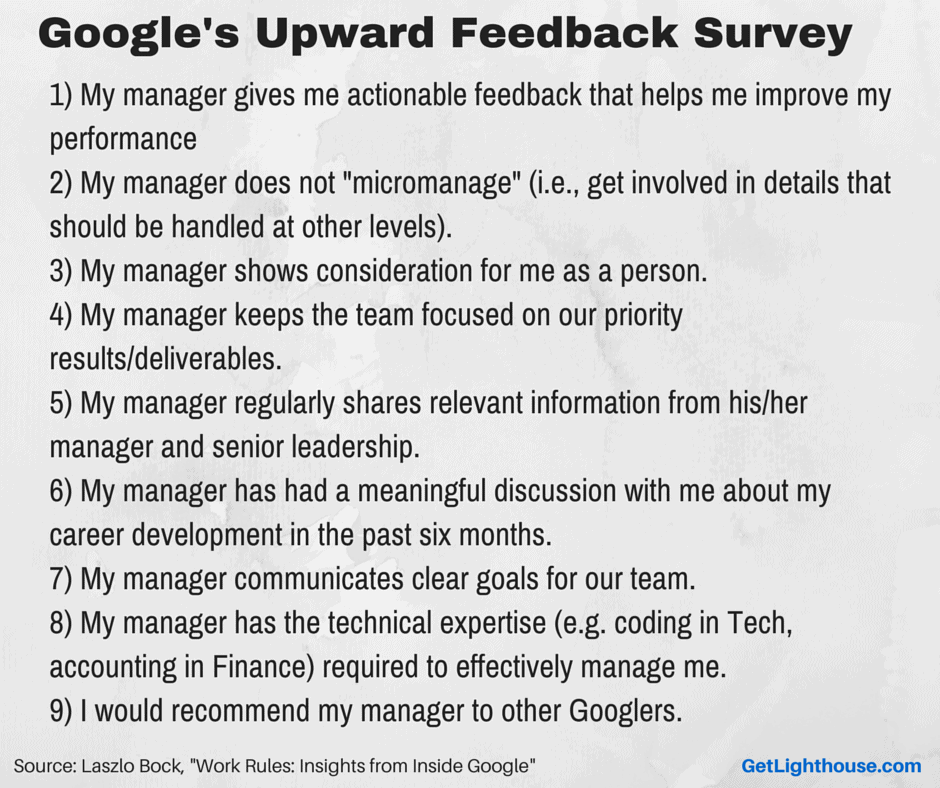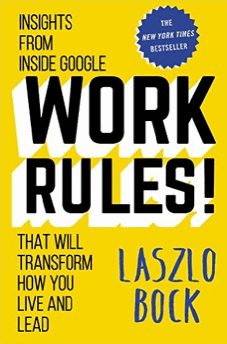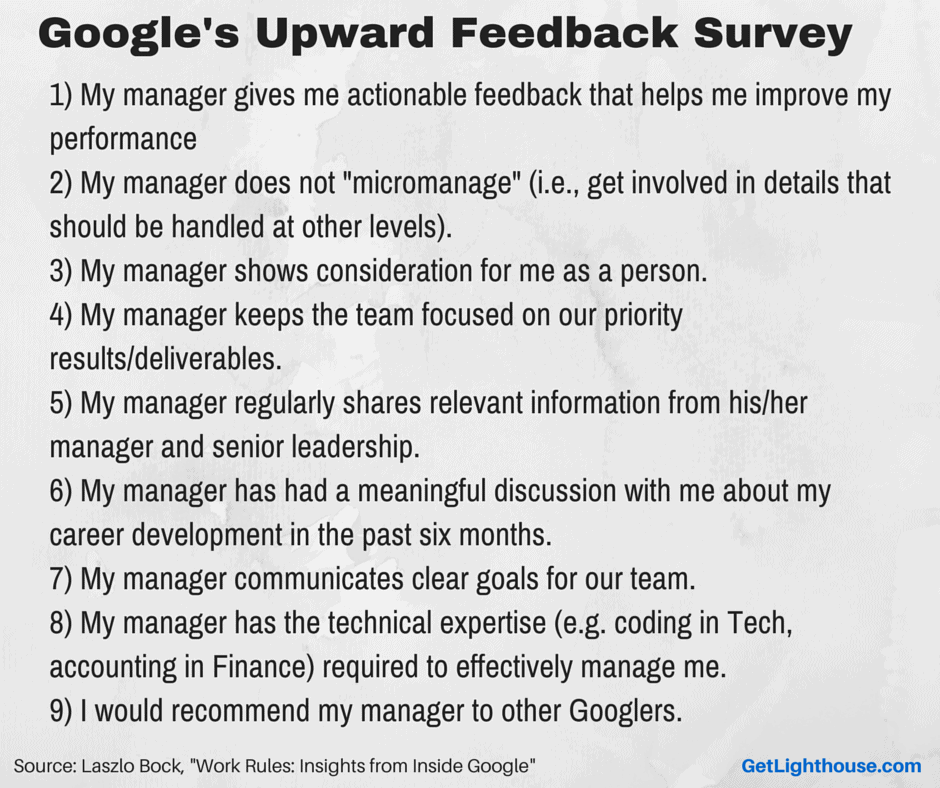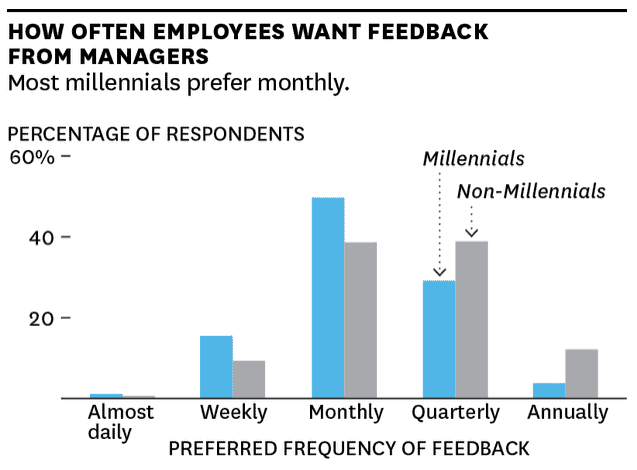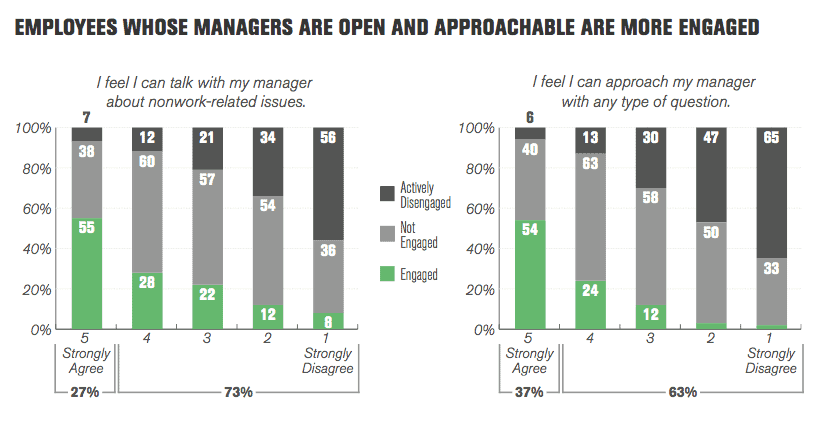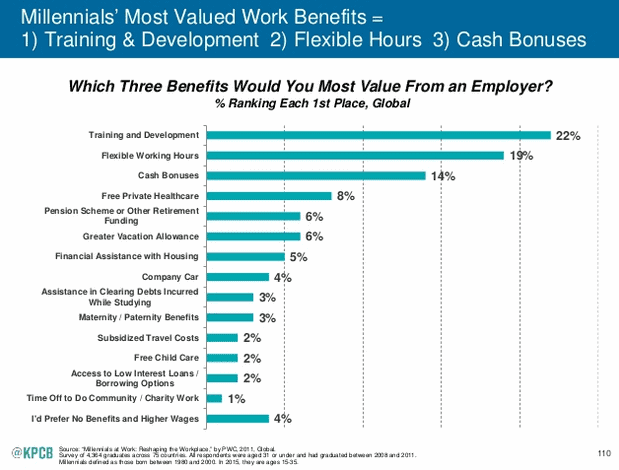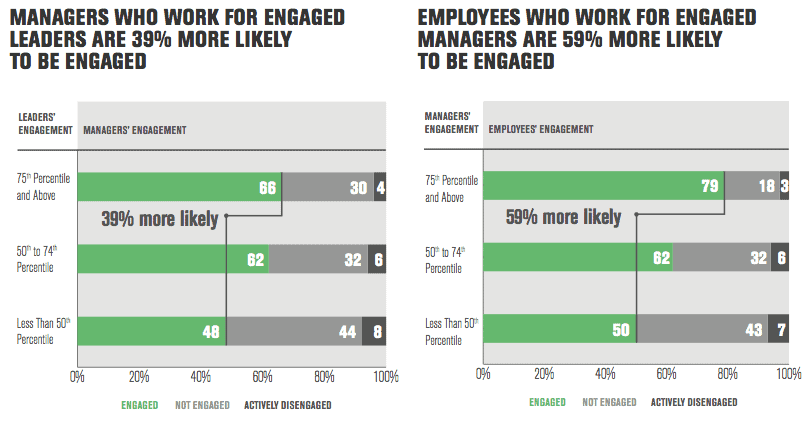How do you measure your managers? How do you know they're doing a good job?
If you're like most companies, you do the occasional 360 feedback, watch team retention numbers, and hope for the best. Unfortunately, much of that can end up being too little, too late.
Employees leave managers not companies. And they have a habit of leaving in waves. By the time that happens, you've lost hundreds of thousands of dollars (or more) in lost productivity and re-hiring costs. And by then, you probably will have to consider firing the manager who now has a stained reputation.
There has to be a better way, right? A way to catch these problems before they cause permanent, and costly, damage.
Thanks to Google, there is a better way.
The Questions that Ensure the Effectiveness of Google Management
Google has studied management in ways no company has before. Their scale combined with their engineering-driven culture has led to rigorous, research-grade study of Google management. They have an entire team devoted to these kinds of questions called, People Analytics.
This led to the famous experiment and research, codenamed Project Oxygen, which proved that, yes, managers are important and necessary. Luckily, once Google proved to themselves empirically that managers mattered, they focused on what makes a great manager, and how to measure that so it can be improved across the company on an ongoing basis.
The Google Approach
In Laszlo Bock's recent NY Times best-selling book, "Work Rules: Insights from Inside Google," he reveals many of the secrets to Google's success with their people, culture, and managers. He shares their scientific methodologies to their internal studies and many of the great findings they uncovered. He's even pretty honest about some of their failures.
One such discovery was the set of questions they use for team members to evaluate their managers. This helps Google reward their best managers, and help improve their worst ones.
Unlike their million dollar stock grants that only mega companies like Google can offer, this is something every company can use to help improve their managers.
Let's take a look at what those questions are, and where evidence beyond Google supports their value.
Google Management's UFS (Upward Feedback Survey)
Below are the questions Google uses to measure their managers as described in Bock's book. (Specifically page 197 in Chapter 8, for those of you who want to read more for yourself.)
A few caveats: The details of how Google runs these surveys is important, so here's a few notes from the book:
- All questions are scored on a scale of 1 to 5.
- Strongly Agree, Agree, Neutral, Disagree, and Strongly Disagree
- They score the managers based on the percentage of scores that are favorable.
- Strongly Agrees and Agrees are considered favorable
- Managers are compared to their previous scores and the average Google manager score that time.
- So they can see if they're getting better or worse and how they compare to others
- The surveys are 100% anonymous and do *not* impact performance management evaluations
- This avoids managers gaming the surveys and pressuring team members to not answer honestly
- Many managers go over their results with their team
- It starts a dialogue about things that the manager can specifically change, flipping the usual manager-employee relationship
Now that we know the questions, let's look at why they work.
The Table Stakes
Three of the questions aren't all that surprising. They're the table stakes that any company is likely to measure their managers on: competence and execution of tasks.
- My manager keeps the team focused on our priority results/deliverables.
- My manager communicates clear goals for our team.
- My manager has the technical expertise (e.g. coding in Tech, accounting in Finance) required to effectively manage me.
Most companies can quickly identify a manager lacking significantly in any of those 3 areas. And in most companies, that's usually the only thing they measure. That's why the other six are the most important and worth further examination.
The 6 Surprising Questions that Ensure Effective Management at Google
With the obvious questions out of the way, let's look at each of the other ones in more detail by exploring what other supporting information is out there beyond Google.
1) My manager gives me actionable feedback that helps me improve my performance
Delivered well, feedback can help you become much better at the work you do, which will help you advance in your career. The problem is, most people don't get enough of it. And managers are generally the person who can best provide it, so when you're not getting enough, it's largely their fault.
While the data Google used to create their survey question is now years old, we know they were ahead of the curve. Millennials are a generation that craves more frequent feedback than any generation before, as this study from SAS revealed earlier this year:
With Millennials now the largest demographic in the workforce, managers must invest more in providing feedback. The best way to ensure that happens across your company is to make it a part of how you measure your managers.
2) My manager does not "micromanage" (i.e., get involved in details that should be handled at other levels).
No one likes to be micromanaged, but it's easy to fall into the trap. It's one of the fastest ways to frustrate someone on the job and stymie their creativity.
Managers don't have all the answers. Their teams bring unique perspectives and are doing the actual work, which makes them more likely to create the best solutions. This shouldn't be surprising, but it's often overlooked.
That's why in Dan Pink's awesome TED talk on The Puzzle of Motivation the first of his 3 keys is: Autonomy. (And the others, Mastery and Purpose, translate well to questions about Goals and Communication below)
If you trust your people to do great work and find the best solutions, they may just surprise you.
You don't even need to have high tech workers to do it, either. Toyota's Total Production System is built on the premise that anyone on the assembly line can and should stop the system if there's a problem. They also train managers to solicit feedback and ideas for improvements from each team member. This doesn't happen unless you value autonomy and avoid micromanagement.
3) My manager shows consideration for me as a person.
The stereotype of a bad manager is a self-absorbed leader that doesn't care for anyone else (see Dilbert, The Office, or Office Space). This is not the kind of person people are inspired to work hard for.
Instead, the kinds of managers that have the most effective teams, start out by building a foundation of rapport and trust with their teams. Just as Google found it a key to their best managers, external data backs this up. In Gallup's recent State of the American Manager report, they found that this kind of appreciation for your people was a huge driver of engagement:
Work is such a large part of your life. It's too short to work for people that don't care for you as a person. Checking whether people perceive their manager cares about them is a good way to demonstrate it's an important trait for managers to exemplify at your company.
4) My manager regularly shares relevant information from his/her manager and senior leadership.
Especially as your company grows, it can be easy for people to feel out of the loop and disconnected. Managers are often in more meetings and have access to more information that helps them understand what's going on and the impact of their work. Since their team isn't in all of those meetings, it's important for that information to be communicated to them.
Leaders have to be deliberate about this because otherwise there are dire consequences as Ben Horowitz, former CEO of Opsware and VC at A16Z, has written:
"Perhaps the CEO's most important operational responsibility is designing and implementing the communication architecture for her company. The architecture might include the organizational design, meetings, processes, email, yammer and even one-on-one meetings with managers and employees.
Absent a well-designed communication architecture, information and ideas will stagnate and your company will degenerate into a bad place to work."
A CEO can't talk with everyone all the time, so they need the help of their managers. This means your managers must become skilled at helping spread messages, often repeating themselves more than they feel necessary. And the only way to be sure this is happening sufficiently is to ask what employees think with a question like this.
5) My manager has had a meaningful discussion with me about my career development in the past six months.
Here's a common story I have heard from a number of friends:
Joe joins a fast-growing, exciting company that brings new challenges and a better job title than he had before. He starts contributing right away.
About 6-9 months in, he has his first performance review and one of the questions he's asked is, "What are your career goals?"
"Finally! I can tell them about my goals," he thinks to himself.
Joe proceeds to excitedly share his biggest goal with his manager who eagerly takes notes and enters it into the HR review system.
And then nothing happens.
A year later, his next review comes around and he's asked again about his goals. Discouraged by the lack of progress, he says it's the same as last year. Happy to get the review done faster, his manager copies his notes from the previous year.
Realizing he's not growing in his role, Joe starts interviewing for a new job that will provide the next growth opportunity for him. Meanwhile, HR can't figure out why Joe stayed for less than 2 years.
Over and over, I've heard from companies with highly rated cultures that they still lose their employees regularly. The common pattern? A lack of career progress has people looking elsewhere.
Are your people growing?
If they're not, there's a great risk that they will become bored, disengage and start looking for new jobs to find growth opportunities.
Once again, Google was ahead of the curve realizing the value of talking about goals with your people. As Mary Meeker's slides on the Internet Trends this year showed, the top benefit Millennials want at work is "Training and Development."
If you want to retain your people, you have to help them grow. It makes every person on your team more valuable to your company and less likely to look for work elsewhere. A person's manager is best person to help them make progress on reaching their goals, so it's important to ensure these conversations are happening.
6) I would recommend my manager to other Googlers.
The Net Promoter Score started as a survey question for marketers ("How likely are you to recommend Product X to a friend or colleague?"), and has become a question used for other great purposes as well. Many companies have started asking an Employee Promoter Score question to see how likely people would recommend working at the company. Google has taken this one step further to zoom in on each manager.
Given that people quit managers, not companies, this makes a lot of sense. Gallup's State of the American Manager report revealed that "50% of Americans have left a job to "get away from their manager at some point in their career,” and that a manager's engagement directly impacts their team's engagement:
--
It's amazing to read about the effort and scientific rigor that Google put into discovering what made someone a great manager and how that impacted their teams. We can all benefit from what Google has learned. It's also fascinating and encouraging to see that their research aligns well with many other sources of research on managers and their impact.
While not everything Google's management does can be brought to your company, these questions are well worth trying with your employees. If you're interested in learning more about Google's approaches to leadership, management, and culture, I recommend you check out Laszlo Bock's book here.

